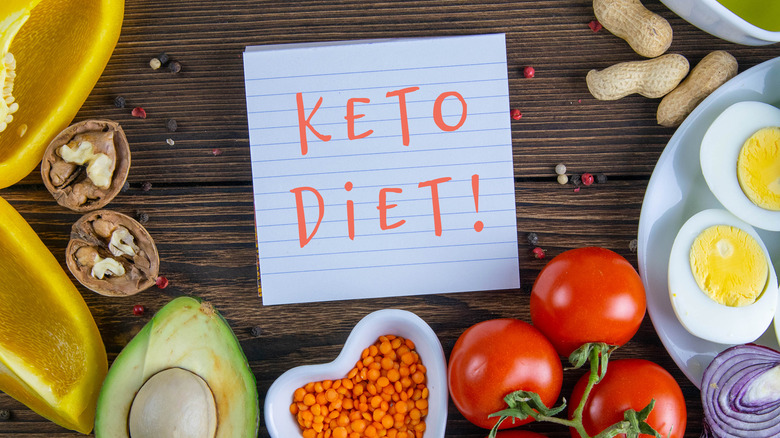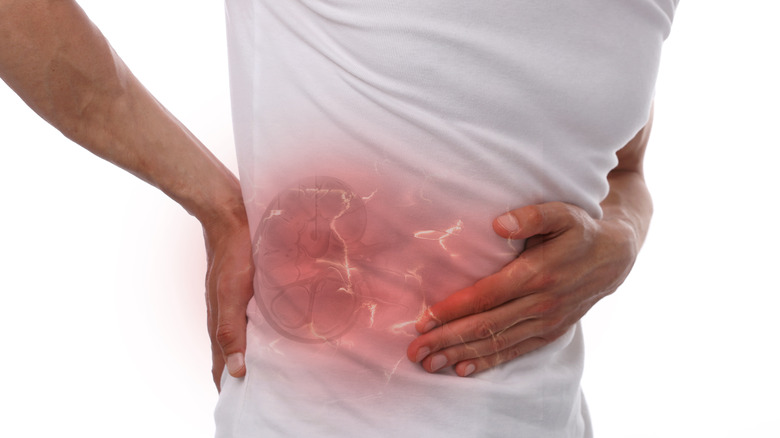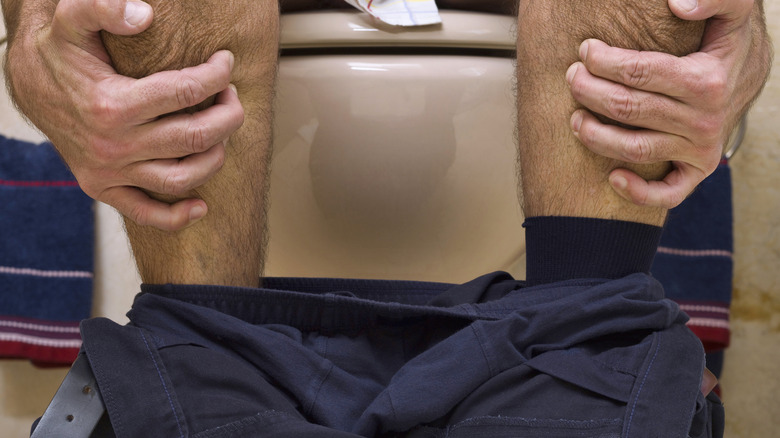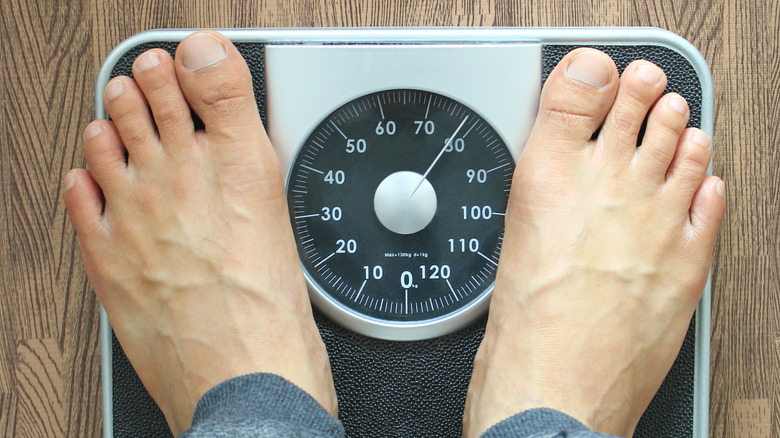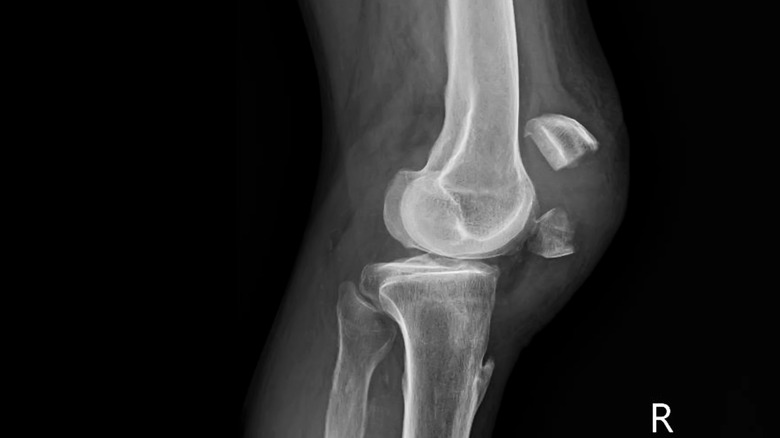Dangers Of The Keto Diet You Should Know Before Starting
Even though the ketogenic diet, or keto diet, has risen in popularity over the past few years, it has actually been around in the medical field for nearly a century. However, the keto diet was not created or initially studied for weight loss.
Believe it or not, it was intended to treat epilepsy, according to a study in Frontiers in Neuroscience. However, once people started to tout the idea that keto was a great option for losing weight while eating foods like butter and bacon, it quickly entered the mainstream as a trendy diet option. And many people report successful results.
The only problem? Well, there are no studies on the effects of eating this way in the long term, Penn Medicine points out. So although people get excited about the numbers on the scale going down, they don't necessarily know what's happening to their bodies on the inside. Everything from their heart health to their digestive health could be at risk. Here are some troubling concerns health experts have raised about the possible dangers of the keto diet.
Increased risk of high cholesterol
The thing about keto that appeals to most people is probably what makes it the most dangerous: It's all about a high intake of fat. Specifically, it's all about a high intake of saturated fat. While every diet needs some amount of fat, keto requires a person to get somewhere around 90% of their daily calories from fat, according to Harvard Medical School.
And while some sources of fat that are often considered healthy fats — because they contain heart-healthy monounsaturated and polyunsaturated fats — are allowed in small amounts, keto actually emphasizes sources of saturated fat like butter, palm oil, coconut oil, lard, beef, pork, and bacon. Cardiologists and other health experts have long discouraged patients from eating these types of foods in abundance because saturated fat poses numerous health risks like high cholesterol.
According to registered dietitian Kathy McManus, a healthy diet should have no more than 7% of its calories from sources of saturated fat every day. On the keto diet, a person could be getting more than 12 times this amount, and all this saturated fat puts you at risk of high cholesterol and other heart problems.
Nutrient deficiencies
By strictly limiting your intake of carbohydrates, your body goes into a starvation mode known as ketosis, wherein your liver starts to break down stored fat into compounds called ketones that your body can use for energy (via Health). The problem is that when we say "strictly limiting," we mean strictly. Keto dieters can have only about 20 to 50 grams of carbohydrates a day if their body is going to go into ketosis. And because it takes several days for your body to enter this state, there's no flexibility in terms of having a moderate amount of carbohydrates at any meal, according to Healthline.
Keeping your carb intake this limited means you have to avoid many nutritious foods — many fruits, vegetables, and whole grains are off this list. And according to Health, these long-term limitations on your diet could put you at risk for severe nutrient deficiencies because you're not getting enough of the foods that contain vital vitamins and minerals.
Stress on your kidneys and liver
Although the science is still inconclusive, some doctors have started theorizing that keto-style diets can result in problems like kidney stones and fatty livers because of the extremely high levels of fat. Business Insider explains that the amount of meat and fish that keto dieters consume can create inordinate levels of calcium and uric acid in the body. This uric acid can then solidify in the urine and form into kidney stones. These solid mineral deposits then must be eliminated from the body via the urinary system. The uric acid can also form into urate crystals, which lead to gout.
It's important to note that these conditions are not conclusively linked to a ketogenic diet. Specifically, doctors aren't sure whether this has more to do with the nutrient balance (high fat and little carbohydrates) as much as it has to do with the heavy consumption of meat.
Keto might also put just as much strain on the liver, according to a January 2020 review published by Cureus, which looked at a woman with obesity who undertook a ketogenic diet and had high levels of liver enzymes. When she went off the keto diet, the level of liver enzymes went down. The review concluded that fatty liver disease could be a risk of such high fat intake.
Constipation
Because the keto diet requires adherents to eat so few carbohydrates, such ones will be getting far less fiber than they likely would normally. Fiber is a type of carbohydrate found in grains, fruits, and vegetables that passes through the body undigested and bulks up stool in the intestines. Healthline explains that fiber is an important nutrient for healthy bowel movements. Many people who do not get enough fiber, such as those on the keto diet, suffer from constipation, in which the stool is hard and difficult to pass.
Occasional constipation is something many people will have to deal with from time to time, but people who have chronic constipation can experience problems like hemorrhoids and anal fissures. Certain laxatives may not even be a viable option for relieving the constipation that accompanies the keto diet, as many contain carbohydrates — and they could take a person's body out of ketosis.
Diarrhea
It's entirely possible for a keto dieter to escape constipation but instead suffer from the opposite problem: diarrhea. If you're wondering why a diet lacking in fiber and known for causing constipation might also cause diarrhea, well, we hear you. And Virta Health offers a few explanations.
In some cases, it might be because a keto dieter is eating high levels of certain types of fats, notably those containing omega-6s and omega-3s. These fats can be handled by the body only in limited amounts, and higher levels of them can results in feelings of nausea. They'll also result in diarrhea.
Another possibility is that a keto dieter is opting for processed foods that are low in carbohydrates but high in sugar alcohols like xylitol or sorbitol. These ingredients are useful because they sweeten foods without any added sugar, but they can cause gastrointestinal distress when consumed in large amounts.
Brain fog
Some people go on the keto diet and find that they have improved mental clarity and fewer moments of distraction or forgetfulness. But many others find that brain fog is a very real side effect. As Discover Magazine explained, people who've gone keto may experience what's known as brain fog, something that's very likely linked to withdrawal from carbohydrates.
These moments of brain fog will usually go away after a few days of being on keto. But if they don't, you might need to try making other adjustments. Staying hydrated by drinking more water and having a tad more salt could reduce brain fog. Another option is to cut back on strenuous exercise for a time.
It's worth noting that brain fog is something people talk about anecdotally — so it's not an actual clinical term. Therefore, it's tough for doctors and dietitians to make formal recommendations about how to handle the brain fog on a keto diet.
Dehydration
When a dieter's body enters ketosis, they will likely lose a lot of weight very quickly. But don't be fooled into thinking that this initial weight loss is all fat. It's very likely that much of this weight is from water. And losing all of this water weight very quickly can put a keto dieter at risk for dehydration. In fact, Everyday Health lists the keto diet as one of several fad diets that can dehydrate a person.
When your body enters ketosis and the ketones are released into your bloodstream, your body will respond by increasing your rate of urination to eliminate the ketones. Frequent urination leads to dehydration as well as imbalances of your body's electrolytes and a deficiency in water-soluble vitamins like vitamin C and B vitamins (via Medical News Today). If you're following the keto diet and want to do it in a healthier way, you should make sure you're increasing your consumption of water.
Ketoacidosis
It's not just your liver and kidneys that will suffer from the release of too many ketones — your blood sugar could be affected as well. This can lead to a condition called ketoacidosis. Those with either type 1 or type 2 diabetes are especially at risk for ketoacidosis, but it has the potential to affect others as well, according to Health.
Ketoacidosis, as its name might suggest, is characterized by increased acidity of the blood. Acidic blood will show itself in symptoms like bad breath and dry mouth. A person with ketoacidosis might also have to urinate frequently, struggle to breathe, or suffer from nausea. Dieters who experience these symptoms should not consider them a minor inconvenience — these are signs something is wrong, and your acidic blood could ultimately cause damage to vital organs like the brain. People with diabetes who hope to use a keto diet to manage their blood sugar should first consult a medical professional and be very diligent about monitoring their glucose levels.
The 'keto flu'
Although it might not be as serious as nutrient deficiencies or kidney stones, the "keto flu" is still not a very pleasant experience. According to Prevention, the keto flu happens when your body is entering ketosis and eliminating any of its carbohydrate stores.
The keto flu is not contagious like the actual flu, and its symptoms can vary from person to person. However, most keto newbies can typically expect to experience some fatigue, headaches, muscle cramps, and overall weakness during the first few days of being on the keto diet. You may also experience some nausea and deal with diarrhea or constipation. Some people even experience skin rashes and mood swings. Most people will stop feeling these symptoms after their body has fully gone into ketosis and has begun using ketones for energy. This can take longer than you'd think, though. "It takes a while, usually a week or two, for the metabolic machinery to shift to fat-burning mode," Kristen Mancinelli, registered dietitian and author of "The Ketogenic Diet," told Prevention. "And you'll feel pretty crummy while the transition is happening."
Pregnancy risks
Good nutrition during pregnancy is a given. What an expectant mother eats is what provides energy, vitamins, and minerals to her growing baby. It makes sense that pregnant women would want to be very diligent about their diet (via WebMD). However, extremely restrictive diets, such as the keto diet, can pose problems. In fact, the keto diet might be even riskier than other restrictive diets, according to WebMD.
The site explained that the limited intake of the B vitamin folic acid (sometimes called folate) could hinder brain and spine development in a fetus. Folic acid is often found abundantly in fortified grain products like cereal and bread, and by eliminating these foods, a pregnant woman might not be getting the amount of folic acid she needs. The other problem is weight gain. While many pregnant women gain some amount of weight, doctors have concerns that the high levels of saturated fat in a keto diet could raise blood pressure during pregnancy.
Weight regain
It's not unusual for a fad diet to result in weight gain after a dieter goes back to regular eating, according to the Cleveland Clinic. And keto diet is really no different in that regard. If anything, keto is actually a diet that makes it easier to regain the weight. This is because it depends on the body's being in a state of ketosis, and that happens only when your carbohydrate intake is strictly limited.
As Insider explained, keto isn't a diet that allows flexibility. You can't neglect your diet for a meal or two. Instead, as soon as your body has glycogen from carbohydrates, it will start using that glycogen for energy instead of the ketones your liver is creating from stored fat. Just like that, you're no longer losing weight — and you can easily start to gain it back. It will also take several days of restricting carbohydrates for your body to return to ketosis. This lack of flexibility makes keto a very difficult lifestyle to sustain in the long term.
Decreased muscle mass
You might be surprised to think of keto as a diet in which you'd lose muscle mass. After all, low-carb diets tend to be high in protein, so wouldn't it make sense for you to gain muscle mass instead? Eat This, Not That pointed out that keto is different from other low-carb diets in that it emphasizes a high intake of fat and a rather modest intake of protein. This is because large amounts of protein can actually interfere with your body's state of ketosis.
So if you're enjoying the chance to consume all the butter you've ever wanted, and you're thrilled to see that you're losing weight, you might want to stop and consider how many of the pounds you're losing are coming from your muscles. If you're going to go low carb but you still want to maintain or even gain muscle mass, you're better off avoiding the keto craze and finding an eating plan that emphasizes protein instead of fat.
Poor exercise performance
Losing muscle mass isn't the only reason that athletes and other active individuals might want to avoid the keto diet. It turns out this diet could also lead to reduced fitness levels. A study published by the Journal of Sports Medicine and Physical Fitness examined test subjects who followed a keto diet plan and compared their workout performance with a group of test subjects who ate the same number of calories on a high-carbohydrate diet (via Healthline).
After four days of following their respective diets, the group of people who were eating keto were exercising at lower peak power than those who were eating carbohydrates. Based on these results, the study concluded that the keto diet has a negative effect on athletic performance. Dieters who are trying to improve their physical fitness or even train for some kind of event or competition may want to consider a diet that provides them better energy.
Increased risk of chronic disease
Staying on the keto diet long term goes against most nutritional wisdom. Sure, the diet may help you lose weight very quickly, but there are risk factors that come along with eating high levels of saturated fat and limited amounts of fiber, vitamin and mineral deficiencies, dehydration, muscle atrophy, et cetera. Namely, you're at an increased risk of chronic diseases like cancer and heart disease.
The keto diet is distinct in that its eating pattern is built around saturated fat, which is primarily found in animal foods like meat, dairy, and eggs. According to a 2018 study and meta-analysis published by The Lancet Public Health, a low-carbohydrate diet is linked to a higher mortality rate compared with a diet that has a moderate 50 to 55% intake of carbohydrates. Among the low-carb diets, those that were high in animal products tended to have a mortality rate greater than even low-carb diets that were heavy on plant-based fat and protein sources.
While this study did not specifically look at the keto diet, this science is there to show that eating large quantities of animal-based fat and few carbs can increase your chances of dying earlier.
A detrimental effect on bone health
You might have good reason to pick a bone with anyone who recommends the keto diet after you hear about this risk.
As it turns out, eating keto might be really bad for your bones, as Eating Well explains. This is based on a study out of the Australian Institute of Sport in partnership with Harvard Medical School, which looked at two groups of race walkers over the course of several weeks. One group ate a high-carb diet, while the other group went keto. The results of the study showed those who ate a keto diet ended up having weaker bones.
After returning to a diet with carbohydrates, these test subjects only saw partial recovery from the trial. Their indications of bone breakdown decreased, but their poor bone formation and bone metabolism remained the way they were after keto. This negative effect after only a few weeks is especially concerning, because poor bone health can put people at risk of injury and reduced quality of life as they get older.
Moodiness
Once you start doing keto, you might notice that you just aren't feeling yourself — you're irritable, a little bit grumpy, and maybe even easily provoked. You could even find yourself going through mood swings where you're perfectly fine one minute and then one little thing ruins your whole day. What gives?
It turns out this moodiness could be an effect of keto. Harvard Health Publishing explains that when your brain isn't getting the sugar it needs from carbohydrates, it doesn't function properly. This leads to such mental side effects as confusion, poor thinking, and yes, irritability. Men's Health points out that this keto moodiness is the same as any other bout of low blood sugar. More importantly, your body needs carbs if it is going to be producing serotonin, a brain chemical necessary for balancing out your mood.
This also might have something to do with the saturated fat in a keto diet, as the Sydney Morning Herald reports. Saturated fat constricts your blood vessels, and that includes blood vessels running to your brain.
An inability to get a good night's sleep
Low serotonin levels as a result of going keto might cause other negative side effects besides mood swings. They could also be causing a bad bout of insomnia.
The Sleep Sherpa explains that serotonin is just as necessary for relaxation as it is for an overall good mood. What's more, there's another chemical your body isn't producing: melatonin, which prompts feelings of sleepiness. Without serotonin or melatonin, your body doesn't feel tired the way it normally does, and you might have trouble nodding off.
Plus, there's another reason keto might affect your ability to sleep. Your body is changing the way it metabolizes and produces energy. But these high energy levels that you enjoy so much during the day could last well into the night. All of a sudden, bedtime rolls around and you're still hyped up on ketosis. This can make it very difficult to get the shut-eye you need.
